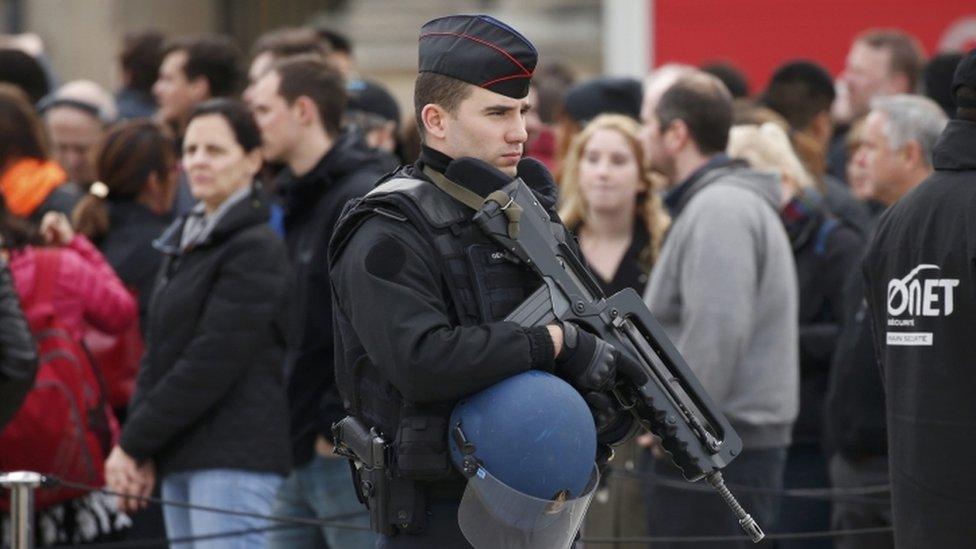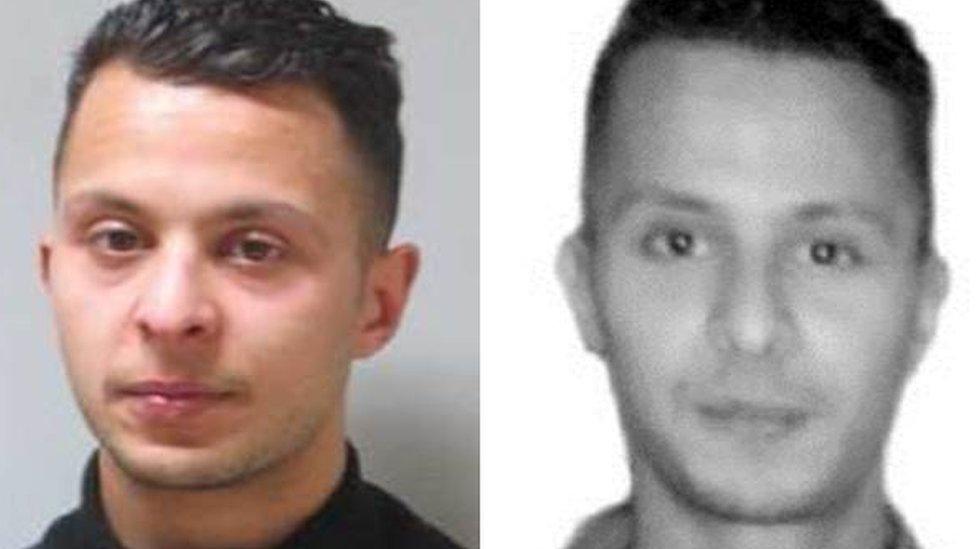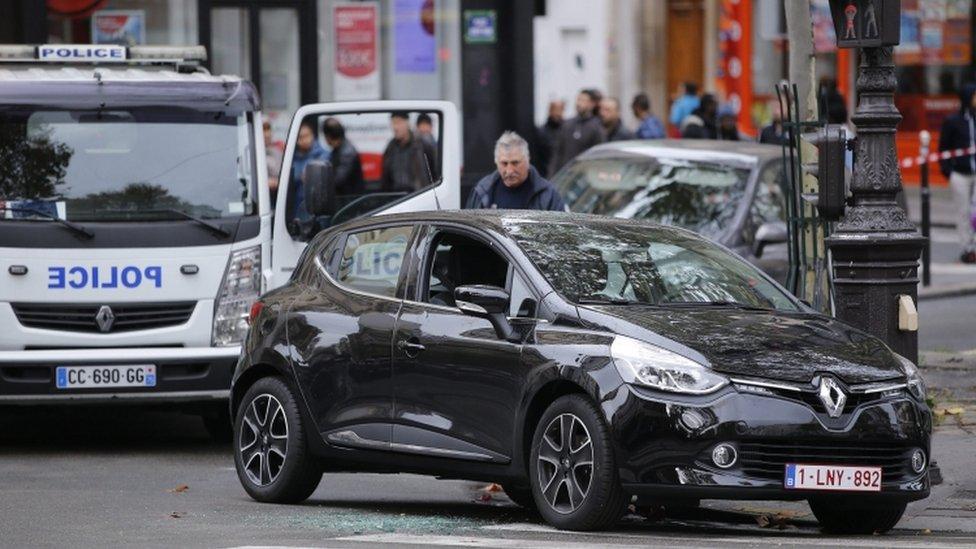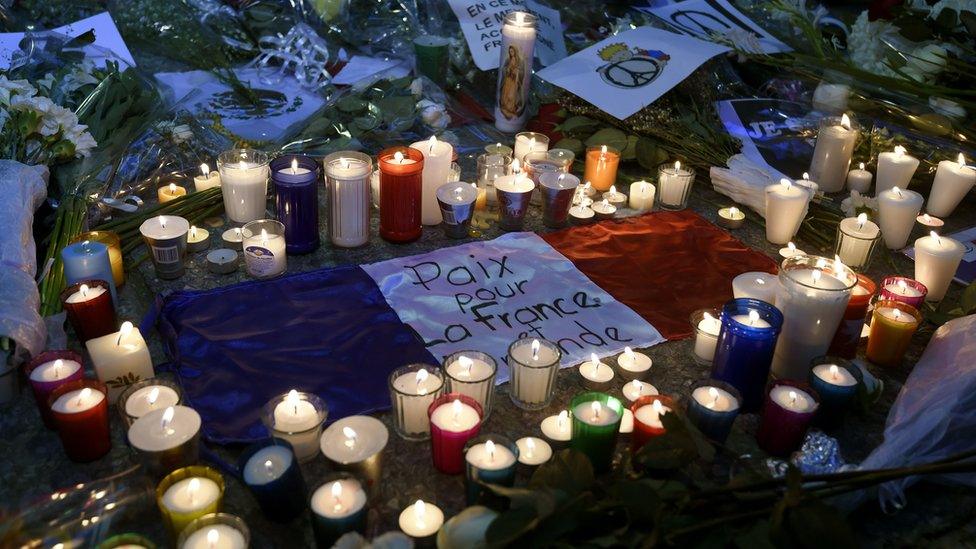Paris attacks: France mobilises 115,000 security personnel
- Published

Security is high as museums reopen in the French capital
France has mobilised 115,000 security personnel in the wake of Friday's Paris attacks by Islamist militants, Interior Minister Bernard Cazeneuve has said.
Mr Cazeneuve said 128 more raids on suspected militants were carried out. French air strikes also hit Islamic State in Syria overnight.
IS has said it carried out the attacks on bars, restaurants, a concert hall and a stadium in which 129 people died.
A huge manhunt is under way for one of the suspects, Salah Abdeslam.
He is believed to have fled across the border to his native Belgium. Belgian police have released more pictures of the wanted man.
Follow the latest live updates
Belgium's government has raised its terror threat level because of the failure so far to arrest Abdeslam. Tuesday's football match between the national team and Spain has been cancelled as a result.
Mr Cazeneuve said: "We have mobilised 115,000 police, gendarmes and military over the whole of our national territory to insure the protection of French people."
The interior minister added that 128 raids on suspected Islamist militants had been carried out overnight on Monday to Tuesday. More than 160 raids were made earlier on Monday, with 23 people arrested and dozens of weapons seized.
Paris attacks: Doctor on 'feeling of war' in A&E
French media reported that during raids police found a safe house used by the attackers in Bobigny, a suburb of Paris. Abdeslam's brother Brahim, who died in the attacks, is thought to have rented it.
A property in another suburb, Alfortville, has also been identified as being used by the attackers, and a car is being investigated, media said.
Mohamed Abdeslam, brother of suspects: "I was not involved in any way"

New pictures of suspect Salah Abdeslam have been released

Police are investigating a car thought to have been used by the attackers
German media reported three arrests near Aachen, on the Belgian border, in an operation linked to the attacks.
Meanwhile France has invoked a previously unused clause in the Treaty on European Union, external obliging other member states to provide it with "aid and assistance by all means in their power".
Within minutes, EU foreign policy chief Federica Mogherini said that all 28 member states had agreed.
"Today France asked the European Union for aid and assistance. And today the whole of Europe replied in unison: 'Yes'." she tweeted (in French), external.

More on the Paris attacks
What happened in Paris? How events unfurled on Friday evening in the French capital.
Who were the victims? Details of some of the 129 people killed in the attacks.
The fight against Islamic State at home and abroad The attacks have highlighted once again the difficulties in providing total security in a modern, open Western capital.
Most wanted: Alleged mastermind Profile of key suspect Abdelhamid Abaaoud, thought to be behind the attacks and now based in Syria.
Anonymous 'declares war' on Islamic State The hacking group vows to use its knowledge to "unite humanity" and "hunt down" IS members.

The measures came as US Secretary of State John Kerry visited Paris.
After meeting French President Francois Hollande, he said everyone understood that after Paris and other recent attacks "we have to step up efforts to hit them at the core" and improve border security.
He added that Syria was weeks away from a "big transition" after international talks in Vienna at the weekend.
A group of young Muslim men tell the BBC's Graham Satchell about how they are treated in Paris
Mr Hollande is due to fly to Washington and Moscow next week for talks with US and Russian leaders.
Meanwhile early on Tuesday, French warplanes carried out fresh strikes against the IS stronghold of Raqqa in northern Syria, the army general staff said, destroying a command centre and training centre.

Sympathy for France is being expressed worldwide, including outside the French embassy in Mexico City
The attacks in Paris - which also left more than 400 people wounded, some critically - have galvanised Western countries in their campaign against the so-called Islamic State.
UK Chancellor George Osborne said in a speech that IS was trying to develop the ability to launch deadly cyber-attacks on the UK.

President Hollande's proposals
Extension of state of emergency by three months
Changes to the constitution to allow the government to revoke citizenship of any convicted terrorists of dual nationality. Currently only those born outside France and naturalised can lose their citizenship
Measures to speed up expulsion of foreign nationals considered a threat to public order
Budget increases and extra recruitment to security forces and judiciary

During a visit to the GCHQ listening station in Cheltenham, he announced that the UK's investment in fighting cybercrime would double.
President Hollande told a rare joint session of the French parliament on Monday that he would table a bill to extend for three months the state of emergency declared after the attacks. Parliament will vote on the measure on Wednesday.
According to Prime Minister Manuel Valls, intelligence services have files on 10,500 individuals who have been radicalised to a greater or lesser extent.

Suspected Paris attackers
Salah Abdeslam, 26 - urgently sought by police
Brahim Abdeslam, 31 - named as attacker who died near Bataclan concert hall
Omar Ismail Mostefai, 29, from near Paris - died in attack on Bataclan
Bilal Hadfi, 20 - named as attacker who died at Stade de France
Ahmad al-Mohammad, 25, from Idlib, Syria - died at Stade de France (unverified)
Samy Amimour, 28, from near Paris - suicide bomber at Bataclan
Two other attackers died during the assaults in the city

As well as the attackers themselves, investigators are also reported to be focusing on a Belgian of Moroccan descent who is described as the possible mastermind of the attacks.
Abdelhamid Abaoud, 27, lived in the Molenbeek neighbourhood of Brussels, as did two of the attackers, and is now believed to be based in Syria, where he has risen through the ranks of IS.

What is Islamic State?
IS is a notoriously violent Islamist group which controls large parts of Syria and Iraq. It has declared its territory a caliphate - a state governed in accordance with Islamic law - under its leader Abu Bakr al-Baghdadi.
What does it want?
IS demands allegiance from all Muslims, rejects national borders and seeks to expand its territory. It follows its own extreme version of Sunni Islam and regards non-believers as deserving of death.
How strong is IS?
IS projects a powerful image, partly through propaganda and sheer brutality, and is the world's richest insurgent group. It has about 30,000 fighters but is facing daily bombing by a US-led multi-national coalition, which has vowed to destroy it.

Were you in the affected areas on Friday? Do you have any information you can share? You can get in touch by emailing haveyoursay@bbc.co.uk, external.
Please include a contact number if you are willing to speak to a BBC journalist today. You can also contact us in the following ways:
WhatsApp: +44 7525 900971
Tweet: @BBC_HaveYourSay, external
Send pictures/video to yourpics@bbc.co.uk, external
Text an SMS or MMS to 61124 or +44 7624 800100